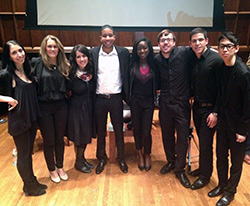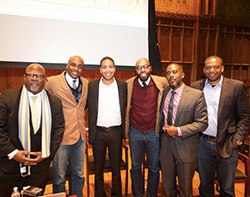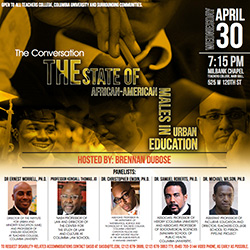Empowering the Storyteller: Changing the Narrative of African American males in urban contexts
By Brittiany Croom
How do we begin to disrupt society’s often negative perceptions about African American males and urban education?
How do we recreate a narrative of the African American male identity that is not married to violence, hyper-sexuality, or criminality?
How can we create classroom ecosystems that work better for African American males – including teachers that look like them, pedagogies that work for them, and environments that can help them succeed?
Those were some of the questions raised at “The Conversation Presents The State of African-American Males in Urban Education,” an event held in TC’s Milbank Chapel at the end of April that featured a panel of five African-American, male Columbia professors – the first cross-campus all African-American male professor panel in Columbia University’s history.
The speakers were Christopher Edmin, Associate Professor of Science Education at TC, Director of Science Education at the Center for Health Equity and Urban Science Education, and Caperton Fellow and Hip-Hop Archive Fellow at the W.E.B. DuBois Institute at Harvard University; Ernest Morrell, Director of the Institute for Urban and Minority Education, Professor of English Education at TC and also President of the National Council of Teachers of English (NCTE); Samuel Roberts, Associate Professor in the Department of History and in the Department of Sociomedical Sciences at the Mailman School of Public Health and Faculty Research Fellow for the Institute for Research in African-American Studies-Columbia University; Kendall Thomas, Nash Professor of Law and Director of the Center for the Study of Law and Culture at Columbia University; and Michael Wilson, Assistant Professor of Inclusive Education and Director, Teachers College School to Prison Pipeline Project.
The central concern addressed by all of the speakers was the stereotypes – including and perhaps especially those that are held and perpetuated by well-intentioned people.
“We’re focused on and obsessed with what’s going wrong, and that becomes the entire narrative,” said Wilson, who directs TC’s School-to-Prison Pipeline Project.
Stereotypes not only create external barriers for young men of color, but also affect the way they see themselves, said Emdin, who has used hip-hop as a tool for engaging urban students in science education. “Black males inherit society's perception of them, which may impact their ability to be successful in schools.”
Beyond good intentions, Morrell suggested, the antidote requires an effort by society to see young African American men as human beings with the same aspirations, self-worth and potential as others.
“You can't have education without love,” he said.
At the same time, however, the African American community has to do more for its young men than engineer an image makeover. The struggle to improve educational outcomes remains a political one – a battle for equal resources and opportunities that not only did not end when the Supreme Court struck down school segregation 60 years ago, but may in fact have become more urgent.
“The greatest trick the Devil ever pulled was convincing the world he didn't exist – that’s ‘post-racism’ in America,” said Roberts.
“I want to advocate for a way of thinking and talking about the education of all black males, within networks of solidarity,” Thomas added.
Adding to the buzz around the panel discussion was the fact that it marked this year’s final installment of The Conversation, a “talk-show” formatted web-series that is the brainchild of Brennan DuBose, a TC master’s degree student in Communication and Education. The two previous installments were “The School To Prison Pipeline” (now accessible on YouTube) and a “two-for-one special” of two topics, “Homophobia in Youth Culture” and “Undocumented Youth In The U.S.” Each event has incorporated technology, with the audience able to view a live Twitter feed using the hashtag (#TheConversationTC ) on a TV screen.
DuBose, who hosts the show, is supported by The Team, an all-student production unit consisting of Ricardo Anzar, a master’s student in Bilingual/Bicultural Education with a concentration in policy; Alejandra Montoya-Boyer, an M.A. candidate for Instructional Technology and Media; Joe Riina-Ferrie, a doctoral student in the Communication, Computing, Technology and Education program; Aeloch “Enok” Kim, who is seeking his M.A. in Instructional Technology and Media; Katie Pienkos, a Communication and Education M.A. candidate; Tiffany Touma, a master’s student in Secondary English Education; and Whitney Warner, candidate for her M.A. in International Educational Development.
“I am so thankful and humbled to be able to work with an honest, supportive, humorous, fact-based, and over-all brilliant group of people” DuBose says.
Vice President Janice Robinson’s Office for Diversity and Community Affairs sponsored “The State of African-American Males In Urban Education.” TC’s Black Student Network, Coalition of Latino/a Scholars and Student Senate have promoted all segments of The Conversation. The Institute for Research in African-American Studies (IRAAS) of Columbia University and The Center for the Study of Law and Culture of Columbia Law School also promoted the final show.
DuBose kicked off the April installment by contrasting stereotypes of African-American males in the educational system – disrespectful, disengaged, underperforming – with real-world success stories such as that of Chicago’s Urban Prep, which since its first graduating class in 2010, has boasted 100 percent college acceptance among its African-American male students.
One of the concluding assertions from the panel was the idea that negative narratives of African-American males might potentially be disrupted if youth are empowered to establish new and positive narratives. For DuBose that possibility speaks directly to the purpose of The Conversation:
“To go there. That place where the questions that people don’t want to ask or topics people shy away from, are asked and discussed.”
Creating a Counter-Narrative
Brennan DuBose, creator and host of The Conversation, entered TC on the eve of the trial of George Zimmerman, the accused killer in the Trayvon Martin shooting. Feeling that many people talking about the case weren’t fully aware of the facts, he decided to create a space for enlightening conversations within the university. DuBose began speaking with the College’s different student organizations and professors about his idea, and by early October had convened “The Team,” an all-student group that has met weekly not only to develop and produce the shows but also to package them for airing on YouTube.
“In today’s society there is a strong intersection between technology and media and how it can innovate and educate on the development, structure, and functioning of human society,” DuBose says.
DuBose, a 2011 graduate of Howard University, is receiving his M.A. in Communication and Education next week. He credits his late grandmother, Louise Wingfield McNair, for telling him he could accomplish anything if he worked hard enough.
Published Thursday, May. 15, 2014


